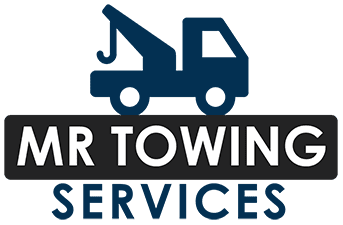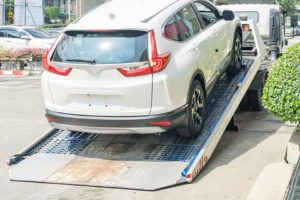Have you ever had a vehicle parked on your property without your permission? It can be a huge nuisance and often surprisingly difficult to take action against. In this blog, we’ll break down all the necessary information about private property towing so you don’t get caught out – from what it is, to the legal requirements and when to use it.
What is Private Property Towing?
Most people are unaware that there are different types of tow truck services available, and that private property towing is a thing. Private property towing is when a tow truck company is hired by a private landowner to remove vehicles from their property. This type of tow truck service is different from the police-ordered tows or parking lot impounds that you may be more familiar with.
There are many reasons why a landowner would want to hire a private property towing company, but the most common reason is because someone has parked on their property without permission. This can be a major inconvenience for the landowner, as it takes up valuable space that could be used for other purposes. In some cases, it can even pose a safety hazard.
Another common reason for private property towing is if a vehicle has been abandoned on the property. This can be especially frustrating for landowners, as it not only takes up valuable space but can also be an eyesore. In some cases, abandoned vehicles can even attract vermin or become a breeding ground for bacteria and other harmful organisms.
If you’ve had your vehicle towed from private property, don’t panic! The first thing you should do is contact the tow truck company that removed your vehicle and find out why it was towed. In most cases, you’ll just need to pay a small fee to have your vehicle released. However, if your vehicle was towed without proper notice or authorization, you may be entitled to reimbursement for the towing fees.
State Laws on Private Property Towing
Most states have laws governing the towing of vehicles from private property, and these laws vary from state to state. In general, however, there are a few things that you should know if you’re planning on having a vehicle towed from your property.
First, it’s important to check with your local law enforcement agency to see if there are any specific requirements for private property tows in your area. Some jurisdictions require that you obtain a permit before having a vehicle towed, while others may have restrictions on where vehicles can be stored after they’ve been towed.
Second, be sure to contact a reputable tow company that is familiar with the laws in your area. There are many unscrupulous tow companies out there that will take advantage of unsuspecting customers, so it’s important to do your research and choose a company that you can trust.
Finally, be sure to document everything related to the tow, including the date and time of the tow, the location of the vehicle at the time of the tow, and any damage that may have occurred during the tow. This documentation will be crucial if you need to file a complaint or dispute the charges with the tow company later on.
How to Avoid Being Towed From Private Property
If you’re parking on private property, it’s important to be aware of the rules and regulations that may be in place. Otherwise, you could find yourself being towed – and that’s never a fun experience.
To avoid being towed from private property, make sure you:
- Check for signs: Most private property will have signs posted clearly stating the tow policy. Be sure to take a look around before you park so that you know what you’re getting into.
- Ask permission: If there’s no sign or you’re unsure about the policy, it’s always best to err on the side of caution and ask permission from the owner or manager before parking.
- Pay attention to time limits: Even if there are no signs posted, many private properties have time limits for parking. If you’re going to be parked for more than a few minutes, it’s worth checking with the owner or manager to see if there are any time restrictions in place.
Following these simple tips should help you avoid being towed from private property. But if you do find yourself in that unfortunate situation, don’t panic – we’ve got all the information you need on what to do next.
What to Do If You Get Towed from Private Property?
If your vehicle has been towed from private property, the first thing you should do is contact the tow company. The tow company will be able to tell you how to retrieve your vehicle. In most cases, you will need to pay a fee to the tow company in order to get your vehicle back.
Once you have retrieved your vehicle, you should then file a complaint with the Better Business Bureau (BBB). The BBB will investigate the tow company and take appropriate action if they find that the company has engaged in unfair or deceptive practices.
If you believe that your vehicle was towed illegally, you can also file a complaint with your local police department. The police department may investigate the tow company and take action if they find that the company has broken any laws.
What Are the Costs of Private Property Towing?
The costs of private property towing vary depending on the company you use and the type of vehicle you need to be towed. Generally, the cost of a tow truck ranges from $75 to $125 per hour. The average cost of a tow is about $100. The price may be higher if you live in a rural area or if your vehicle is large or heavy.
Alternatives to Private Property Towing
There are a few alternatives to private property towing that you can consider if you don’t want to deal with the hassle and expense of having your car towed. One option is to park in a public parking lot or on the street instead of in a private lot. This way, you won’t have to worry about getting your car towed or paying for damages if it’s damaged while parked on private property.
Another alternative is to use a service that will help you find public parking spots. This can be especially helpful if you’re not familiar with the area where you’re parking. The service will show you available parking spots and tell you how long you can park there. This can save you time and money, as well as avoid the potential headache of having your car towed.
If you must park on private property, make sure you read the signs carefully so that you know the rules. Be aware that some private lots may tow cars that are parked illegally or without permission. If possible, try to park in a spot that is well-lit and visible from the street so that tow trucks will be less likely to target your vehicle.
Ultimately, it’s up to you to decide whether the risk of having your car towed is worth it for the convenience of parking on private property. If you do choose to park on private property, make sure you understand the risks involved so that you can avoid any unpleasant surprises down the road.
In conclusion, private property towing is a service that is used by many businesses and organizations. It’s important to be aware of the laws governing parking in your area and to know what rights you have as a vehicle owner when it comes to being towed away from private property. Knowing these details can help you avoid any potential fines or other legal repercussions for violating the rules regarding proper parking on someone else’s property.
MR Towing Services tows practically every type of vehicle you can think of. Our towing services include cars, SUVs, trucks, RVs, box trucks, motorcycles, and tractors. If we can tow a tractor, you best believe we can handle the towing of your car! Call us today! 214-238-5134

